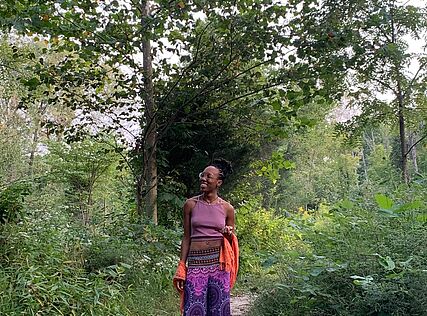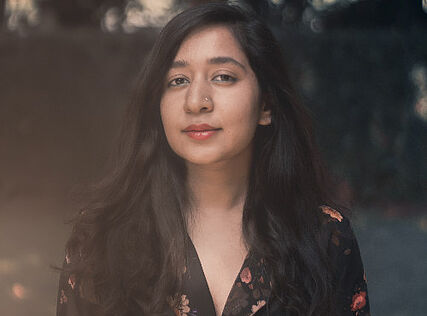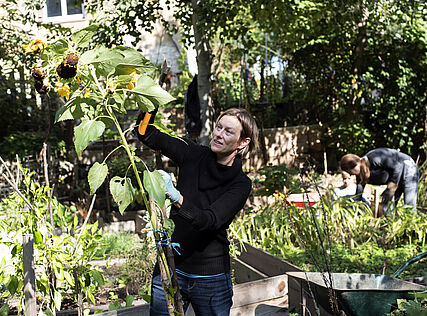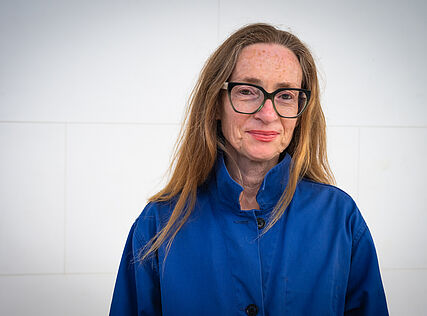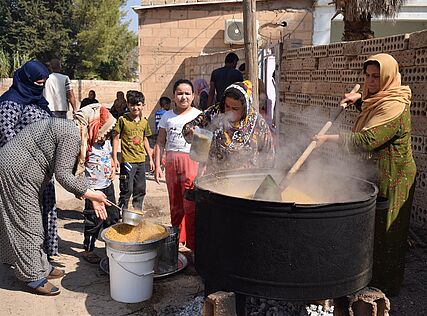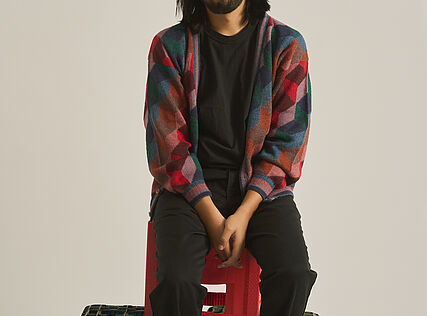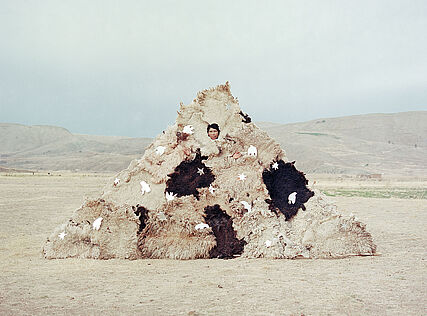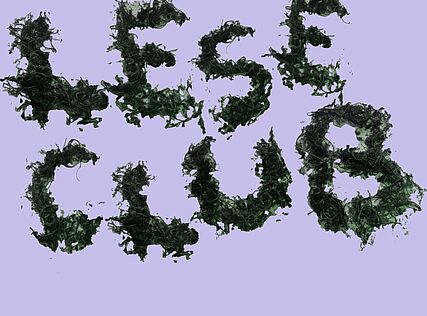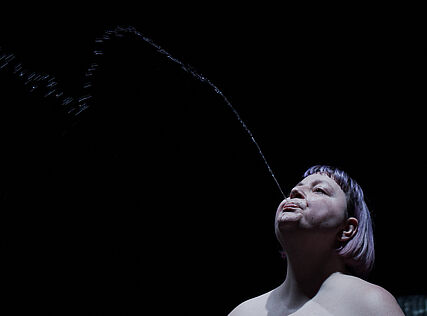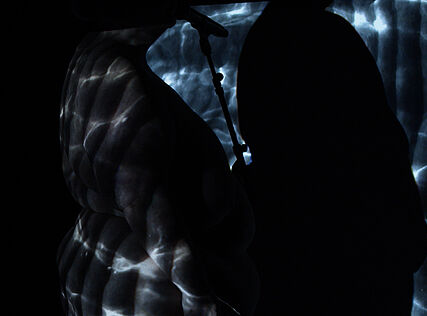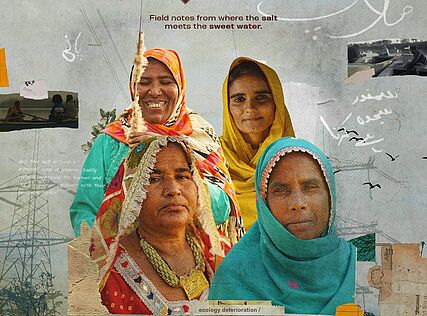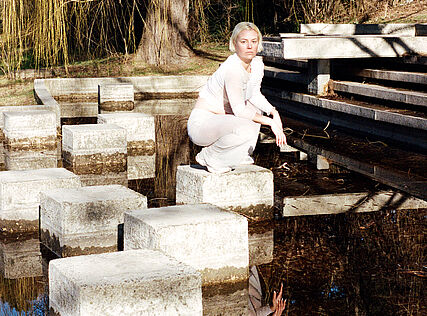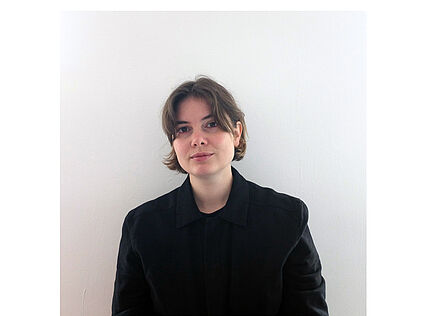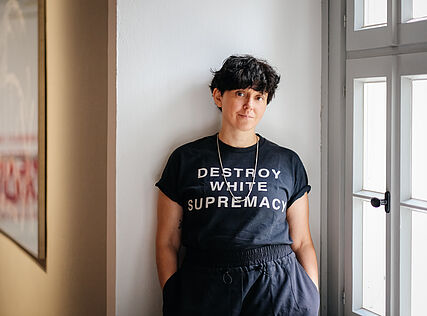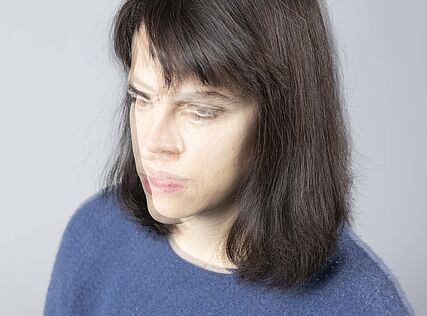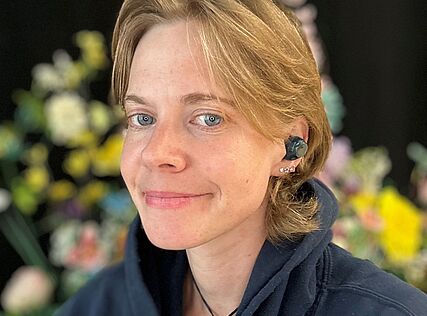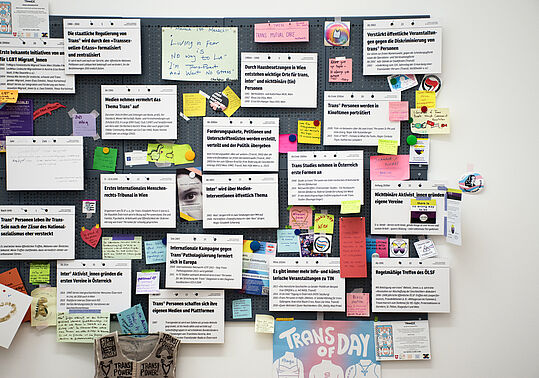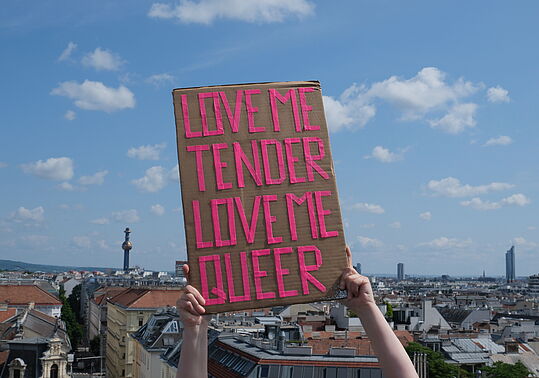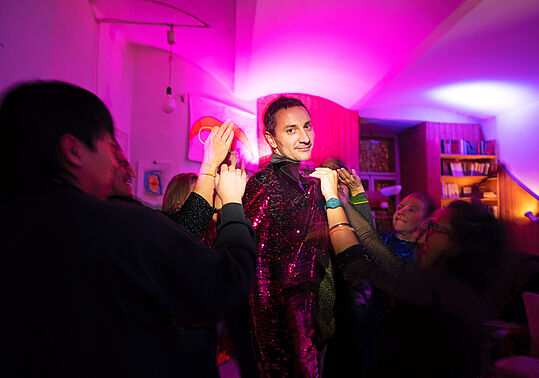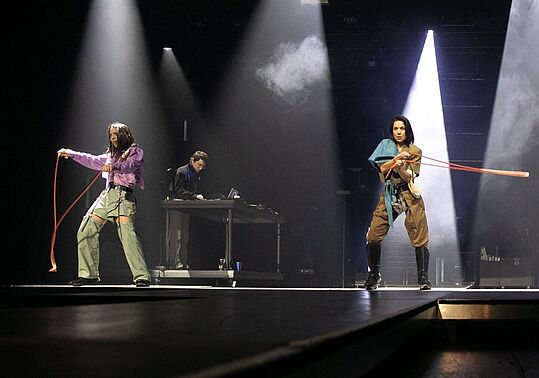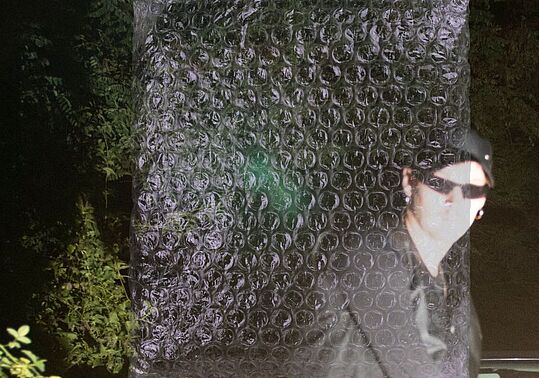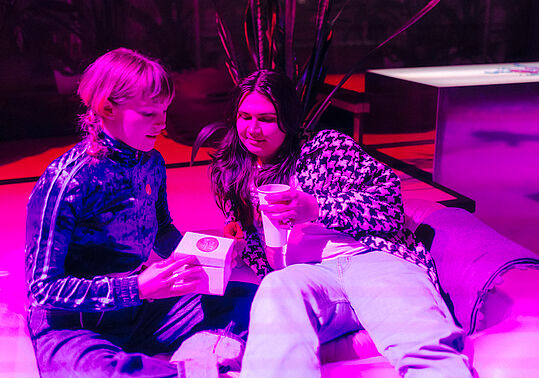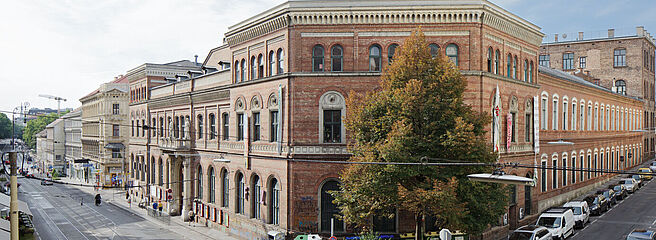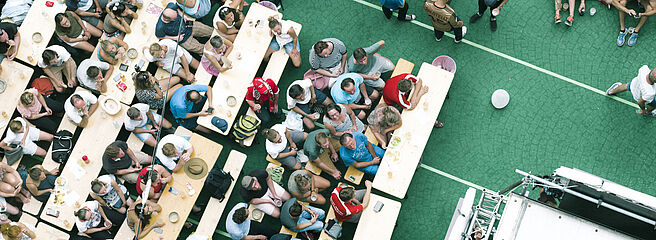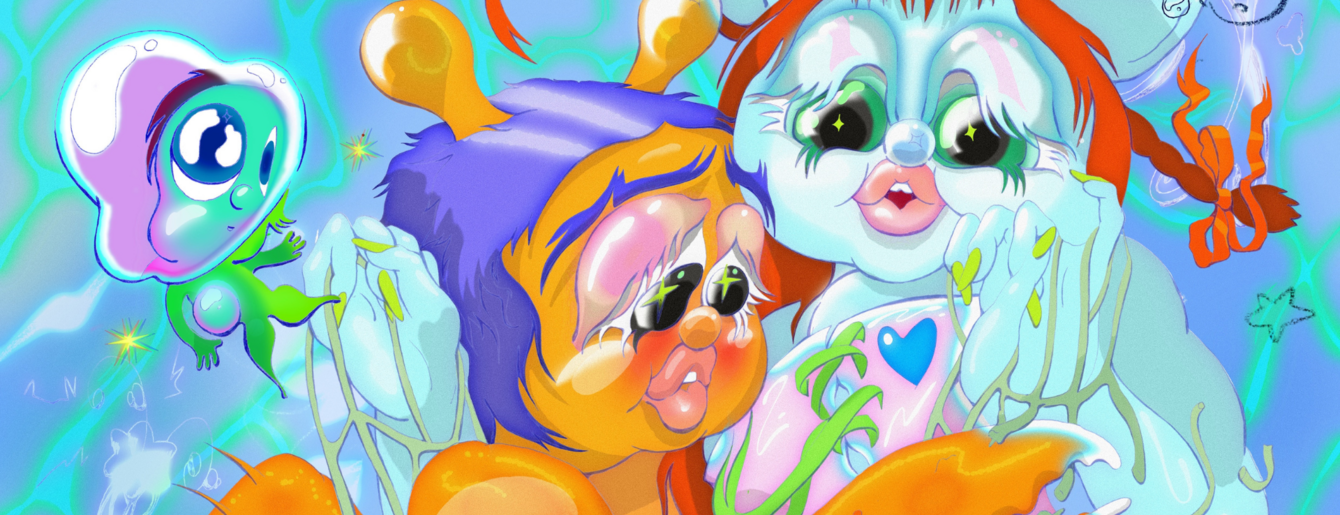
Sa 4.10.2025
10.15 am - 6.30 pm
Museum
A
Ecofeminist practices in art & activism - DAY 2
Das Symposium widmet sich aktuellen ökofeministischen Ansätzen in der Kunstproduktion, angesichts einer zerstörten und ausgebeuteten Welt. Unser Anliegen ist, entgegen autoritärer Repressionen, Orte zu beschützen, feministisch-diskursive Räume und soziale Infrastrukturen in Kunst und Kultur zu stärken und Austausch zu fördern. Das Symposium befasst sich mit Praktiken der Nachhaltigkeit und queeren Gegenerzählungen zu Ökozid und Formen der Gewalt. Wie können wir als politische Akteur*innen im Kunstbetrieb bestehende Allianzen stärken und was können wir in der aktuellen Situation für das künstlerische Arbeiten in Wien von ökofeministischen Ansätzen lernen?
Organisiert von Natalie Assmann, Sophie Lingg und Mir Raggam-Alji im Rahmen von DANUBE REQUIEM by RRRIOT – Verein zur Förderung und Vermittlung feministischen Kulturschaffens.
Programm TAG 2 – SAMSTAG 04.10.
10.15 – 11.45 Uhr
seeing has never been believing hosted by Imani Rameses
Bodywork Session
(in Englischer Sprache)
*Seeing has never been believing, and I dare you to find out why. Join me for a short workshop in moving your eyes to the back of your head...to a place o**ut of sight, out of mind, and finally back into the body.*
12.00 – 14.00 Uhr
Introduction by Symposium Organisers Natalie Assmann, Sophie Lingg and Mir Ragam–Alji
(in Deutsch und Englischer Sprache)
A discussion with Dr. Mekhala Dave on Human – Ocean Relations
Lecture by Dr. Mekhala Dave
(in Englischer Sprache)
Guided by water, she will begin with Rob Nixon’s concept of slow violence – the kind of gradual, often invisible environmental harm that disproportionately affects marginalised communities and ecosystems. From this, she will explore how such violences deplete both land and bodies, engaging with questions of legal personhood for water bodies and how these bodies, in turn, flow through and shape relations between human and other-than-human life.
Her approach draws from queer and ecofeminist thinking, centring interconnectedness, embodiment, and care in the face of extractivist violence. The conversation will also address the global commons, focusing on the critical turning point we face with deep-sea mining and the narratives surrounding the clean energy transition. Mekhala will reflect on how grassroots activism, curatorial strategies, and decolonial artistic practices are actively reshaping the discourse, and how art institutions themselves are responding (or failing to respond) to these planetary urgencies.
Ecologies of Care
Lecture by Urška Jurman and Elke Krasny
(in Englischer Sprache)
Elke Krasny and Urška Jurman will present the Ecologies of Care (EoC) group which includes curators, artists, architects, and researchers working toward new modes of art and cultural practice that enable meaningful social and environmental encounters and that create lasting and transformative relations. Acknowledging that care is always implicated in the given, defined by the aftermath of patriarchal oppression and colonial violence as well as by present-day compulsory neoliberalism and environmental breakdown, EoC work on conflicts related to care and towards the freedom and joy to care.
14.00 – 15.00 Uhr
Eating with Care
hosted Lunch
(in Deutscher Sprache)
Eylem Can ist Kurdin aus Nordkurdistan und für die Frauen- und Ökologie-Bewegung in Rojava aktiv.
Ökologie und Feminismus sind zwei zentrale Grundpfeiler des gesellschaftlichen Aufbaus in Rojava und eng miteinander verbunden. Sie werden in Rojava gemeinsam gedacht, da die Unterdrückung von Frauen und die Zerstörung der Natur als Ausdruck derselben patriarchalen und kapitalistischen Strukturen gesehen werden. Mit Ökologie und Feminismus wird das Ziel verfolgt, eine gerechtere, nachhaltige und solidarische Gesellschaft zu schaffen, basierend auf Selbstverwaltung, Gleichberechtigung und Nachhaltigkeit.
Eylem Can wird während unseres gemeinsamen Mittagessens, das von ihr zubereitet wird, über ökologische und feministische Arbeiten in Rojava und der selbstverwalteten Region in Nord- und Ostsyrien erzählen.
15.00 – 16.00 Uhr
Talk with River Claure
(in Englischer Sprache)
In a pre-recorded online conversation with the organizers of the symposium River Claure will provide insights into his rich artistic practice. The conversation will address the connections between art and identity, indigenous knowledge, environment, extractivism, mining, as well as reclaiming imaginary.
16.00 – 17.00 Uhr
LESECLUB
hosted by Mir Raggam–Alji & Sophie Lingg
Collective Reading Session
(in Deutscher und Englischer Sprache)
Leseclub ist ein regelmäßig stattfindendes Treffen, organisiert von Sophie Lingg und Mir Raggam-Alji.
Seit 2023 werden gemeinsam Texte* gelesen, besprochen und verschiedene Lesetechniken ausprobiert. Die Auswahl der Beiträge (Texts, Graphic Novels, Bilder, Films, Musik, Podcasts, Ausstellungen) ist offen und nicht auf Schrift beschränkt, deutsch- oder englischsprachig und queerfeministisch. Alle Treffen sind immer offen für neue Teilnehmende und wir lesen jedes Mal etwas Neues.
Leseclub is a regular meeting organized by Sophie Lingg and Mir Raggam-Alji.
Since 2023, participants have been reading and discussing texts together while experimenting with different reading approaches. The selection of contributions, ranging from texts, graphic novels, and images to films, music, podcasts, and exhibitions, is open and not limited to written formats, to German or English, and takes a queer-feminist perspective. All meetings welcome new participants, and each session engages with something new.
5 RHYTHMS
hosted by Natalie Assmann
Bodywork Session
(in Deutscher und Englischer Sprache)
Im Rahmen des Symposiums lädt die Künstlerin und Symposium Kuratorin Natalie Assmann zu einer kollektiven Body-Work-Session ein, die sich an der Tanz- und Bewegungspraxis der 5Rhythms nach Gabrielle Roth orientiert. Ausgangspunkt ist die Annahme, dass Schmerz – sei er physisch, emotional oder strukturell verankert – nicht ausschließlich als individuelles Symptom, sondern als ein relationales Phänomen begriffen werden kann, das in Körpern, Geschichten und sozialen Gefügen zu finden ist.
Über 5 verschiedene Rythmen: Flowing, Staccato, Chaos, Lyrical und Stille wird frei getanzt und bewegt, ohne Druck von Außen, sondern mit dem Fokus auf unser individuelles und kollektives Innenleben. Die Body-Work-Session dient als Schnittstelle, an der kognitive Diskurse und theoretischer Input des Symposiums mit somatischen und emotionalen Praktiken verschränkt werden.
Die Praxis ist offen für alle Körper und erfordert keinerlei Vorkenntnisse. In einer queer-feministischen Lesart wird dadurch ein Gegenentwurf zu normativen Vorstellungen von Disziplin, Können und körperlicher Produktivität erprobt. Die Body-Work-Session ist zugleich Teil von Natalie Assmanns laufender künstlerischer Auseinandersetzung mit der Donau, die Stückentwicklung und Premiere dazu findet im April 2026 im WUK performing arts statt.
Gut wäre noch eine Decke, Pullover und warme Socken für den Cool-Down mitzubringen.
17.00 – 19.00 Uhr
Milaap – where the salt meets the sweet water, PK 2023,
a documentary by Marvi Mazhar, Zohaib Kazi, Abuzar Madhu
Filmscreening
30:00 min, OV with English subtitles
Milaap documentary film features the story of three women and the stories of their lives being impacted due to negligent urban rural planning and its consequences to the river and the sea.
The documentary is a visual investigation to open questions about the significance of land and water protection in times of climate crisis but also to provide deeper insight into the rich local shared inherited knowledge which continues to advocate towards living with water, as an ally, in a counter push back towards external development decisions as a form of future’. The documentary film aims to talk about environmental degradation, land rights, human / non-human epistemologies through poems, songs and inherited knowledge.
‘Milaap’ is an urdu word that translates to ‘Union’.
The documentary is an academic study as well as archival of various water prayers and songs from different geographic coordinates along the water terrain. The film discusses milaap, from the perspective of decay and ruptured union.
Bodies of Water
by Julischka Stengele
Filmscreening
OV English
Bodies of Water is a performance short film about the relationship between human and nature, especially queer, overflowing, fluid bodies and water. Movement, voice, text, video, photography and sound are combined into collage, addressing constructions of (un)naturalness and difference as well as questions of connectedness, belonging and kinship, freely after Donna Haraway’s Chthuluzän theory. A poetic encounter of different life forms and materialities making waves together.
Concept, direction, performance: Julischka Stengele; Camera, editing: Magdalena Fischer; Co-produced by Tanzquartier Wien; 2020/2021, 13:43 min
About the artists
Imani Rameses
Imani Rameses (she/her) works within the fields of cognitive science, choreography, and pedagogy. Rameses is a PhD candidate at the University of Applied Arts, Vienna, where she *looks *at the concept of bio-mythois, as it pertains to sight-specific sites, and new neuro-anatomies of the eye. Rameses has shown/performed work at ImPulsTanz, Wiener Festwochen, BRUT Wien, Digital Arts & Science - Zurich, Society for Artistic Research (SAR), and has presented her research at Harvard University, University of Zurich, and University of Johannesburg.
Dr. Mekhala Dave
Dr Mekhala Dave (she/her) is a lawyer and art academic based in Vienna. She is an Ocean Law and Policy Analyst/Researcher, formerly with the Thyssen-Bornemisza Art Foundation (TBA21). She earned a doctoral degree in contemporary art history and curatorial practice from the University of Applied Arts Vienna. In her past and current legal practice, as well as through her doctoral research, she advocates for a social turn in artistic practices and explores encounters located across knowledge spheres and communities in the Global South at the intersection of activism and newly shaping ocean policy. From her lived experiences across borders, she draws inspiration and spiritual guidance from water to the questions of historicity and the search for emerging “new” relations of identity and belonging. She has been mapping deep-sea mining developments from a nuanced and transdisciplinary research at the intersection of art, law, and science, alongside participating at UN platforms like UN Ocean Conference (UNOC) and International Seabed Authority (ISA). She is a member of the international group Deep Currents Collective that envision the deep seabed as an intrinsically relational world on which humans and nonhumans alike depend for their ecological and cultural wellbeing.
Urška Jurman
Urška Jurman (she/her) is an art historian and a sociologist of culture. She is active as a curator, editor and writer in the field of contemporary art. She is a co-founder of the Obrat Culture and Art Association with which she co-authored a number of spatial interventions in Ljubljana, including the community garden _Beyond a Construction Site_ (2010-22). In 2021 she co-initiated (with Elke Krasny) Ecologies of Care network. Her work intersects art, critical spatial practices, ecology, and active citizenship. Since 2013, she has been the programme director of the Igor Zabel Association for Culture and Theory in Ljubljana.
Elke Krasny
Elke Krasny (she/her) is a Professor at the Academy of Fine Arts Vienna. Dr. Krasny’s research is concerned with histories, epistemologies, and practices of transnational feminisms, with politics of memory and dimensions of care and social and ecological justice in architecture, urbanism and contemporary art. Recent publications include: *Living with an Infected Planet. Covid-19, Feminism and the Global Frontline of Care* (2023) and *Feminist Infrastructural Critique* (2024), edited together with Sophie Lingg and Claudia Lomoschitz, https://fkw-journal.de/index.php/fkw/issue/view/89.
River Claure
River Claure (b. 1997) is a Bolivian photographer and visual artist living and working in Cochabamba, Bolivia. Having been born into a family of immigrants from a small community in the Andean highlands, Claure grew up in the city experiencing the tensions between his own indigenous roots and the urban realities of the early 21st century. He received his first training in his hometown of Cochabamba and later studied contemporary photography in Madrid.
Claure is known for his meticulously constructed portraits and magical landscapes. In his work, he questions both dominant notions of cultural identity and the importance of photographic images for our notion of reality. Claure’s work has been exhibited in various platforms and institutions around the world including the 60th edition of the Venice International Art Biennale.
Julischka Stengele
Julischka Stengele (she*/none) is a queer and crip transdisciplinary artist, curator, writer, facilitator and lecturer based in Vienna. After training in cooking, cleaning and serving, Julischka studied design, performance, visual arts and cultural studies in Berlin, Helsinki and Vienna. Julischka’s practice is project based, genre-crossing, multi-medial, formally diverse, thematically broad and focused on creating encounters, atmospheres, relations, experiences and dialogue as a form of art. As a core team member of Kulturverein SALETTL, Julischka co-curates projects that address issues of ecological and social sustainability on the community farm Kleine Stadt Farm in Wien-Donaustadt.
Team
Natalie Assmann
Natalie Assmann (she/her) ist Künstlerin, Regisseurin und Kuratorin. Ihre Praxis bewegt sich im Feld der interdisziplinären Performance und versteht sich als Forschung nach posthumanistischen Konzepten des Zusammenlebens und widerständigen, queer-feministischen sowie antifaschistischen Ästhetiken in der Kunstproduktion;
Assmann´s Arbeiten und Kollaborationen wurden u.a. am Tanzquartier Wien, brut Wien, Schauspiel Köln, Volksbühne Berlin und beim Impulse Theater Festival NRW gezeigt. 2019/20 war sie Co-Leiterin der WIENWOCHE, zuletzt arbeitete sie intensiv am Wiener Kongress “The Art & Abuse” der Wiener Festwochen. 2022 erhielt sie das Arbeitsstipendium der Stadt Wien; Veröffentlichungen und Features erschienen u.a. im Missy Magazin, Grau Magazin und in dem feministischen Magazin an.schläge.
Aktuell entwickelt Assmann gemeinsam mit Vertrauten und Mitstreiter:innen ein Projekt über die Donau (Premiere: April 2026, WUK performing arts). Sie lebt mit ihrer Partnerin und ihrer Hündin zwischen Wien und Berlin.
Sophie Lingg
Sophie Lingg (sie) forscht, experimentiert und organisiert zu Digitalität, digitalen Medien und deren Nutzung für queer-feministisches, künstlerisches Arbeiten und Kunstvermittlung sowie zu Ökofeminismus, öffentlicher Raum und dessen Nutzung. Sie schreibt ihre Dissertation über künstlerische und künstlerisch-aktivistische Arbeit in sozialen Medien (betreut von Elke Krasny). Sie ist Mitherausgeberin des FKW-Journals Feminist Infrastructural Critique. Life-affirming Practices Against Capital (Nr. 74; 2024) sowie Radicalizing Care: Feminist and Queer Activism in Curating (London, Sternberg Press, 2021). Sophie war Teil des Erasmus+-Forschungsprojekts Digital Didactics in Art Education, didae.eu.
Mir Raggam-Alji
Mir Raggam-Alji ist Künstler*in, Filmemacher*in und Kunstvermittler*in, deren Arbeiten sich aus einer queeren, postmigrantischen Perspektive mit antirassistischen und queerfeministische Fragestellungen auseinandersetzen. In der künstlerischen, forschenden und vermittelnden Praxis beschäftigt sich Raggam-Alji mit der kritischen Sichtbarmachung und Analyse tiefgreifender hegemonialer, patriarchaler, weißer Machtverhältnisse und den damit verbundenen Mechanismen gesellschaftlicher Marginalisierung und Ausgrenzung. Diese Reflexion prägen Raggam-Aljis Arbeit und spiegeln deren konsequente Haltung gegen strukturelle Ungleichheit wider.
Raggam-Aljis Arbeiten wurden mit Preisen und Stipendien, wie dem Volkswagen Group Fellowship 2024, dem lime_lab Preis für transdisziplinäres Hörspiel und dem Preis der Akademie der bildenden Künste Wien ausgezeichnet.
Sattva Caru Giacosa
Sattva Caru Giacosa (born in Bailadores, Venezuela; lives and works in Vienna, Austria) The intersection of photography, performance, and installation forms the core of her artistic approach, through which she addresses social themes such as the female body, migration and representation. Drawing on her own post-migratory experience, she examines the tension between hypervisual politics and desensitisation to images, critically engaging with the hierarchies inherent in visual narratives. Using photography as an imaginative medium, she creates historical documents and affective cartographies, focusing on the body as a socio-political territory -- a map of displacement, exodus and exile. Sattva teaches photography, visual narratives and writing, emphasising critical thinking about image-making, the gaze and storytelling.
Charlie Spies
Sattva Caru Giacosa (born in Bailadores, Venezuela; lives and works in Vienna, Austria) The intersection of photography, performance, and installation forms the core of her artistic approach, through which she addresses social themes such as the female body, migration and representation. Drawing on her own post-migratory experience, she examines the tension between hypervisual politics and desensitisation to images, critically engaging with the hierarchies inherent in visual narratives. Using photography as an imaginative medium, she creates historical documents and affective cartographies, focusing on the body as a socio-political territory -- a map of displacement, exodus and exile. Sattva teaches photography, visual narratives and writing, emphasising critical thinking about image-making, the gaze and storytelling.

